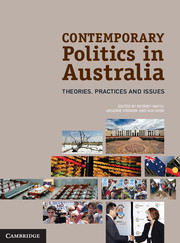Book contents
- Frontmatter
- Contents
- Tables and figures
- Contributors
- Acknowledgements
- Introduction
- I Contemporary Theories of Australian Politics
- Part II Politics in Everyday Australian Life
- Part III Elections
- Part IV Participation and Representation
- Introduction to Part IV
- 15 Participation and representation through political parties
- 16 Pressure groups and lobbying
- 17 Participatory and collaborative governance
- 18 New forms of participation and social movements
- Part V Inside the Australian State
- Part VI Contemporary Public Controversies
- Glossary
- References
- Index
- References
15 - Participation and representation through political parties
from Part IV - Participation and Representation
Published online by Cambridge University Press: 05 June 2012
- Frontmatter
- Contents
- Tables and figures
- Contributors
- Acknowledgements
- Introduction
- I Contemporary Theories of Australian Politics
- Part II Politics in Everyday Australian Life
- Part III Elections
- Part IV Participation and Representation
- Introduction to Part IV
- 15 Participation and representation through political parties
- 16 Pressure groups and lobbying
- 17 Participatory and collaborative governance
- 18 New forms of participation and social movements
- Part V Inside the Australian State
- Part VI Contemporary Public Controversies
- Glossary
- References
- Index
- References
Summary
An understanding of what happens internally within parties, such as how candidates for office are selected and how policy positions are determined, is shaped by theories of democracy (Chapter 1), as well as understandings of rules and institutions (Chapter 2) and models of individual political behaviour (Chapter 3). This chapter links these different theoretical positions by arguing that parties are the main and crucial link between citizens and government, but that this link is made increasingly problematic by the top-down structure of parties. These tensions might be understood in terms of broader shifts in the social identities of Australians, which produce new demands for representation and participation (see Chapters 4 and 5).
Political parties are intended to play a crucial role within Australia’s system of representative democracy and government by providing a link between citizens and the state. In order to do this, parties function as arenas of both participation and representation. In facilitating participation, they provide a forum where citizens (through party membership) can engage with and shape political debate. However, increased disaffection with political parties and a steady decline in membership have been the prevailing trends in recent decades.
- Type
- Chapter
- Information
- Contemporary Politics in AustraliaTheories, Practices and Issues, pp. 166 - 176Publisher: Cambridge University PressPrint publication year: 2012
References
- 1
- Cited by



